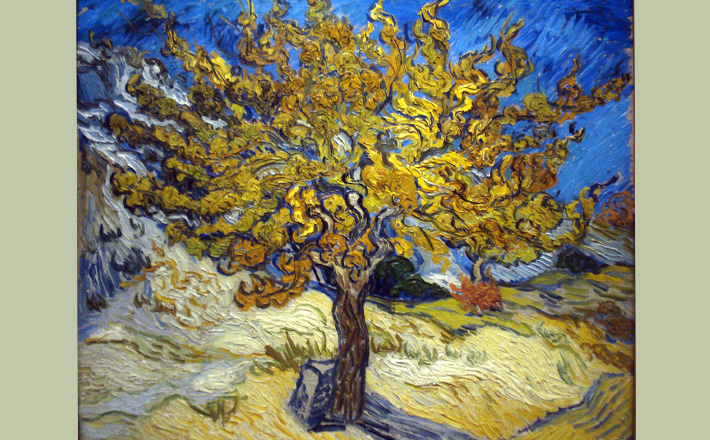Commentary on Luke 17:5-10
Luke 17:5-10 consists of two sets of sayings on being a follower of Jesus.
The first deals with faith (verses 5-6) and the second deals with what is expected of disciples (verses 7-10). Although these two sets of sayings may appear disconnected, they actually deal with complementary aspects of being a disciple of Jesus.
The pericope is part of a larger unit of sayings (7:1-10) that concludes the second phase of Jesus’ journey to Jerusalem in Luke (13:22-17:10). In the sayings immediately preceding this text, Jesus warns his disciples not to cause others to take offense at the gospel message (7:10; 7:23). He also gives counsel on how to deal with a fellow disciple who sins: that person is to be rebuked, and if repentance follows, this same person is to be forgiven — even if forgiveness is needed again and again (17:3-4).
Given the challenging nature of these sayings, and the rest of what Jesus has to say about following him, it is not surprising that the disciples appeal to Jesus: “Increase our faith!” (17:5). Elsewhere Jesus has described what it means to follow him in exacting terms. To a would-be follower, he cautions that the Son of Man has nowhere to lay his head. To those who want to follow him but first take care of family matters, he says that they need to keep the kingdom of God as their first priority without wavering or looking back (9:57-62) To crowds travelling with him, he emphasizes the cost of following him: none can become a disciple without carrying the cross (14:27), placing family ties as secondary (14:26), and giving up all possessions (14:33).
Jesus does not give his disciples an easy answer to their request for faith. With a twinge of irritation (indicated by the Greek syntax in 17:6) he tells them in so many words that they have all the faith they need. Indeed, if they had faith “the size of a mustard seed” they could command a mulberry tree to be uprooted and moved to the sea. Here Luke links a Q saying about mustard seed faith (see Matthew 17:20) with Mark’s saying about the fig tree and faith in God moving a mountain into the sea (11:20-25).
Throughout Luke, those we least expect to have faith are often held up as exemplars of it. When a woman, a so-called “sinner,” pours ointment and kisses Jesus’ feet — to the consternation of Pharisees — Jesus not only forgives her sins but also says “your faith has saved you.” (7:50) He says the same thing to the following individuals: a blind beggar who wants to see again (18:42); a Samaritan leper who comes back to thank him after he has been healed (17:19); and a woman who touches him in order to be healed of hemorrhages (3:48). Moreover, when a Roman centurion goes to great lengths to have him heal a trusted servant, Jesus exclaims, “Not even in Israel have I found such faith” (7:9).
Conversely, the disciples often appear to lack faith. When they are in a boat with Jesus and a storm happens, they get so anxious that Jesus has to ask, “Where is your faith?” (8:25). Aware that Peter will betray him, Jesus prays that his faith will not fail him (22:32).
We often distinguish (a) the faith that “moves mountains” from (b) basic trust in God or Christ. Our tendency to distinguish these two types of faith tends to be rooted in the false assumption that the former has to do with manipulating some kind of supernatural power and the latter has to do with submitting to an external authority or set of beliefs or standards of conduct.
Yet Jesus’ very statement “your faith has saved you” to those he helps implies that something else is going with faith. To have faith means having our whole way of perceiving and responding to life transformed by the fecundity of God’s creative justice and power. What seems “impossible” for us is “possible” for God: God can even enable the rich to “let go” of the wealth they hold so dear and distribute the proceeds to the poor (18:27; 1:37).
What Jesus says about “faith” sets the stage for what he says about being God’s “slaves.” Here Jesus points out that a farmer simply expects a slave to “prepare supper … and serve me while I eat and drink” (17:7-9). Of course, stories about masters and slaves are ethically problematic for us as moderns, who no longer accept the institution of slavery. Yet in the ancient world, a “slave” was not only a socioeconomic entity but also one wholly devoted to another.
Thus, Simeon described himself as God’s “slave” when he gave the baby Jesus a blessing (2:29). Likewise, Jesus admonishes us to be watchful “slaves,” who are not only responsible in using what we have been entrusted (12:35-48), but also prudent in generating as much as we can with what we have been given (19:11-27).
Most importantly, the Gospels transform ancient conceptions of relations between masters and slaves. Unlike Gentile rulers who lord it over others, leaders among Jesus’ disciples must serve. As Jesus observes, “For who is greater, the one who is at the table or the one who serves? But I am among you as one who serves” (22:24-30; cf. Matthew 20:24-28; 19:28; Mark 10:41-45).
If having “faith” — even faith the size of a mustard seed — means having one’s thoughts, feelings, and actions wholly transformed by God’s reign in our midst, then it entails being a “slave” of God: one wholly devoted to the fecundity of God’s purposes in the world. Since God’s life is immeasurable, its generosity eludes any of our attempts to manipulate it — either as a power we can control or as a means for justifying or rewarding ourselves. This is why we are “worthless slaves”: those to whom nothing is owed (17:10). We serve in the banquet of God’s kingdom simply because of who we are, or more importantly, because of the One to whom we belong.


October 6, 2013